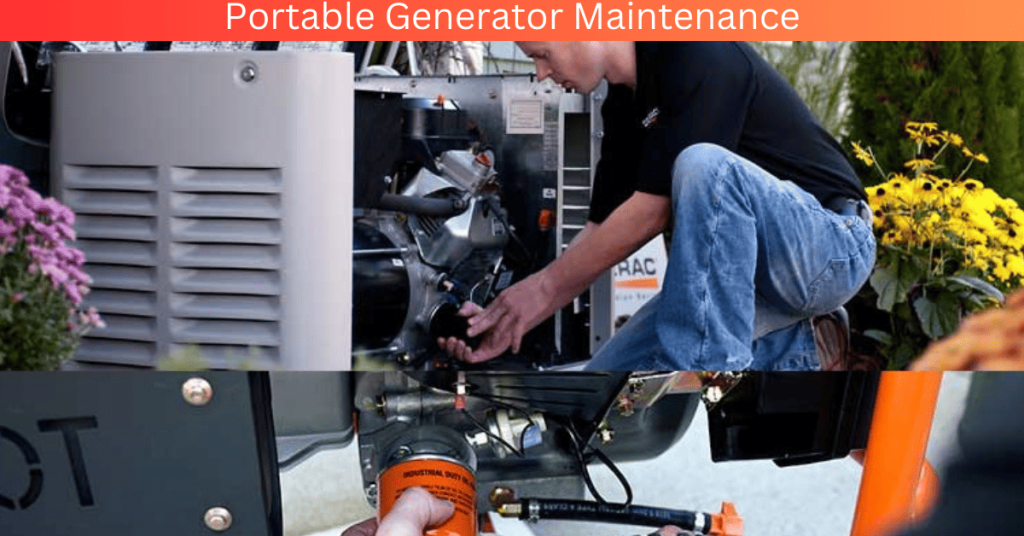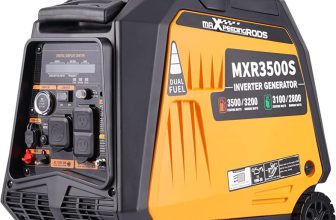Hey there – looking for ways to extend the lifespan of your portable generator? You’ve come to the right place!
In this article, I’ll share my top tips on how to keep your generator running like new. With just a few simple steps, you’ll be able to get the most out of your generator and ensure it lasts you for years.
So if you want to make sure that you get the most out of your investment, read on!

Regular Maintenance
Taking proper care of your generator will help to extend its lifespan. I’m here to give you the top tips for keeping your portable generator running smoothly for many years to come.
The most important thing you can do is regular maintenance. It’s recommended that you perform a general check-up on your generator every few months, or more often if you use it frequently.
This includes checking the oil levels and changing the oil if necessary, making sure all connections are secure and replacing any worn-out parts. You should also make sure that any air filters are clean and not clogged with dirt or debris.
It’s also important to keep an eye out for any unusual sounds or smells coming from your generator, which may indicate a problem or potentially hazardous issue. If this occurs, it’s best to shut down the generator right away and have it inspected by a professional.
Taking these basic precautions will ensure that your generator stays in good working condition for longer.
Proper storage is essential for extending the lifespan of your portable generator.
Proper Storage
Storing your generator correctly is one of the easiest things you can do to make sure it runs great for many years. It’s important to keep the generator in a dry place that isn’t too hot or cold and where it won’t be exposed to the elements. You also want to ensure that it’s not near any combustible materials like fuel, oil, or any other flammable items.
Taking these simple steps can help you get the most out of your generator for as long as possible!
When storing your generator, you should always empty all fuel from the tank and carburetor first. This will prevent contamination from dirt, dust, and other particles. Additionally, if you plan on storing your generator for an extended period of time, it’s best to treat any leftover fuel with a stabilizer solution before putting the tank away. This will help extend its shelf life and make sure it’s ready for use when you need it.
It’s also important to regularly check that all connections are firmly in place, such as nuts and bolts on the frame, battery terminals, and spark plug wires. Doing this regularly can help avoid unexpected breakdowns or even dangerous malfunctions due to loose connections or corrosion.
Taking care of your generator now means fewer problems down the line while ensuring optimal performance over its lifetime. Now let’s look at how we can further extend its life by checking fuel quality…
Check Fuel Quality
Now that you know the basics of proper storage, let’s discuss another key factor in extending your generator’s lifespan: fuel quality. As you may know, gasoline is a volatile liquid and can degrade over time. This makes it important to check the fuel quality on a regular basis.
To do this, start by looking for signs of contamination. If the fuel has a dark color or cloudy appearance, then it has likely already gone bad. Additionally, check for any sediment or particles in the fuel tank – if present, then the fuel should be discarded immediately and replaced with fresh gasoline.
You should also make sure to use stabilizers when refueling your generator. Stabilizers are designed to protect against oxidation and corrosion in engines and prevent deposits from forming in the carburetor and other parts of your generator. Be sure to read and follow the instructions on the product label when using stabilizers; doing so will help keep your generator running smoothly for years to come!
Use Stabilizers
It’s easy to feel excited when you first get your portable generator. You know you can finally power up your appliances and electronics during a power outage or in the great outdoors.
But without proper maintenance, the lifespan of your generator can be shortened dramatically. Using stabilizers is an important part of maintaining your generator so that it lasts for years to come.
One of the best ways to extend your generator’s lifespan is by using fuel stabilizers. These products help fight against corrosion from ethanol and other compounds that can build up over time in fuel tanks. They also help keep fuel fresh for longer periods of time and prevent gum deposits from forming on engine parts. Stabilizers are available both at hardware stores and online, so it’s not difficult to find one that works for you.
Using stabilizers should become a regular part of caring for your generator, as it can help ensure that your machine runs smoothly and efficiently for years to come.
The next step in extending the lifetime of your portable generator is monitoring its oil levels regularly.
Monitor Oil Levels
It’s important to keep your generator running in top shape for as long as possible. Monitoring the oil levels is a key step in ensuring that your generator can go the distance.
Here are some tips on how to monitor and maintain the oil levels of your portable generator.
First, it’s essential to check the oil level before each use. The dipstick should be checked with the engine turned off, and if the oil level is low, then you’ll need to add more oil until it reaches the “FULL” line on the dipstick.
Make sure that you use an API-certified and SAE-rated motor oil – these oils have been proven to help extend the life of your engine.
Another key tip is not to overfill your engine with oil past its maximum capacity. Too much oil can increase pressure in the crankcase and cause excessive wear on internal components – leading to costly repairs or even complete failure of the engine.
These simple steps are essential for keeping your generator running smoothly for years to come – and with proper maintenance, you’ll enjoy reliable power when you need it most.
Now that we’ve discussed monitoring your generator’s oil levels, let’s look at how not to overload it…
Don’T Overload It
I can’t tell you how many times I’ve been frustrated by my portable generator not working when I needed it. And the worst part? It was usually because I had overloaded it. Don’t let this happen to you! When using a portable generator, it’s essential that you understand the wattage of your appliances and the wattage of your generator to make sure that they are compatible.
| Appliance | Wattage Needed |
|---|---|
| Laptop | 90 Watts |
| Vacuum Cleaner | 1200 Watts |
| Toaster Oven | 1400 Watts |
| Coffee Maker | 850 Watts |
Knowing the wattage of each appliance will help you understand how much power you need and whether or not your generator is capable of providing enough electricity for all the appliances that you want to use. This is especially important if you’re using multiple appliances at once, as even the best generators have their limits.
That being said, with careful planning, you can make sure that your portable generator has a long lifespan and keeps on delivering electrical power whenever needed. By following these tips, you’ll be prepared for any emergency situation and have peace of mind knowing that your portable generator is ready to go when you need it most!
Adjust Air Filter
It’s important not to overload your generator, but it’s just as important to ensure that the air filter is correctly adjusted.
A clogged or dirty filter will restrict airflow, causing the engine to work harder and wear out faster.
Replacing the air filter regularly will help keep your generator running efficiently and extend its lifespan.
When you adjust or replace a filter, make sure that you use only genuine parts from the manufacturer.
Generic parts may be cheaper but they often don’t fit properly and can cause serious damage to your engine.
And if something does go wrong, having genuine parts will make it easier for you to get warranty repairs or replacements.
It pays to take care of your generator, so don’t be tempted by quick fixes and generic parts.
Invest in quality equipment and genuine replacement parts – it’s worth it in the long run.
To keep your generator running smoothly and extend its life, you should also use only genuine parts when replacing components or making repairs.
Use Only Genuine Parts
Hey there, it’s time to talk about using genuine parts for your portable generator. You can extend the life of your machine by making sure you use only genuine parts. Not all parts are created equal, and some knock-off versions may be cheaper, but they won’t last as long or perform as well as the real deal.
To help you understand why this is so important, let’s look at a few key points in the table below:
| Genuine Parts | Non-Genuine Parts |
| :–: | :–: | :–: |
| Built to last longer | Shorter lifespan |
| Designed specifically for the model number of your generator | One size fits all designs, not tailored to your specific needs |
| Tested and certified to meet industry standards | Not tested or certified against any known standard |
As you can see from the table above, there are several differences between genuine and non-genuine parts that make choosing genuine parts critical when it comes to extending the lifespan of your generator. Genuine parts are designed with quality and reliability in mind, providing you with a better return on investment over time.
So if you want to maximize the longevity of your portable generator, be sure to use only genuine parts! This will ensure that you get optimal performance out of your machine and keep it running smoothly for years to come. Now let’s move on to cleaning the exhaust system of your generator.
Clean The Exhaust
Now that you’ve got the right parts, it’s time to make sure your generator keeps running as smoothly as possible.
One of the best ways to keep your generator in optimal condition is to clean it regularly, starting with the exhaust. If your portable generator has an air-cooled engine, it’s essential that you inspect and clean the exhaust on a regular basis.
The exhaust can become clogged or blocked from debris or carbon build up which can impede airflow, reduce efficiency, and even damage your engine. Make sure to refer to your manual for specific instructions about how to clean the exhaust safely and correctly.
To keep your generator running at its peak performance level, use a soft brush or cloth to wipe away dirt and dust from the external surface of the exhaust regularly. The more frequently you do this, the better off your generator will be in terms of longevity and performance.
Next up: regularly check for leaks!
Regularly Check For Leaks
Do you want to make sure your portable generator lasts for years to come? Regularly checking for leaks is one of the most important steps you can take. Not only will it help your generator live a longer life, but it will also help prevent costly repair bills down the line.
The first thing to look out for are oil and fuel leaks. These could indicate an issue with the fuel lines or gaskets, which should be replaced ASAP if you find them. Luckily, these components aren’t too expensive and can usually be done in less than an hour.
In addition to oil and fuel leaks, you should also check for exhaust leaks. If left unchecked, this could lead to dangerous fumes inside your home or garage.
The best way to check for exhaust leaks is by using a smoke tester – they’re relatively affordable and easy to use. Doing this regularly means any potential problems can be caught early on and fixed quickly before they become bigger issues!
Frequently Asked Questions
How Often Should I Use A Stabilizer?
If you’re using a stabilizer for your portable generator, it’s important to pay attention to how often you use it.
Using the stabilizer more than necessary can actually reduce the lifespan of your generator.
The best rule of thumb is to only use a stabilizer when absolutely necessary, such as under extreme weather conditions or after extended periods of inactivity.
If you find that you have to use the stabilizer regularly, then it could be an indication that something is wrong with your generator and it may need servicing.
What Kind Of Oil Should I Use In My Portable Generator?
When it comes to your portable generator, the type of oil you use is important for extending its lifespan.
You need an oil that is specifically designed for small engines and generators, such as a high-quality detergent synthetic or synthetic blend oil.
This will keep your engine running smoothly and make sure that it lasts for years to come.
Furthermore, always make sure to check your oil level before each use and replace it if necessary.
How Can I Tell If I’m Overloading My Generator?
If you’re using your portable generator, it’s important to be aware of how much power you’re drawing from it. Overloading can cause damage and reduce the lifespan of your generator.
To check if you’re overloading your generator, start by looking at the wattage rating for each of the appliances or tools you’re running off the generator. Add up all the wattages and make sure that total is lower than the wattage rating on your generator.
If it’s higher, then you need to either take one appliance off or get a more powerful generator.
How Often Should I Change The Air Filter?
You should change the air filter in your portable generator every 3 months or after every 100 hours of use, whichever comes first.
This helps keep the engine components clean and free from dust and debris.
Not changing the air filter regularly could lead to a buildup of dirt that reduces airflow, straining the engine and shortening its lifespan.
To ensure your generator is up to par, check the air filter regularly and be sure to replace it as needed!
What Should I Do If I Discover A Leak In My Portable Generator?
If you discover a leak in your portable generator, don’t panic!
The first thing you should do is check the oil level and make sure it’s topped up. If the oil level is low, top it up with the right type of oil for your generator model.
Next, see if you can identify where the leak is coming from and assess if it’s a minor or major issue. If it turns out to be a minor leak, you can try tightening any loose parts or replacing any worn out seals.
However, if the leak is more serious, then you should seek professional help to ensure that your generator remains safe and in good condition.
Conclusion
It’s important to take good care of your portable generator in order to extend its lifespan.
Regularly using a stabilizer, checking and changing the oil, replacing the air filter, and following proper overload procedures are just a few steps you can take to keep your generator in good shape.
If you ever find any leaks, be sure to get it checked out right away.
With proper maintenance, you can enjoy the convenience of having a reliable portable generator for years to come.





